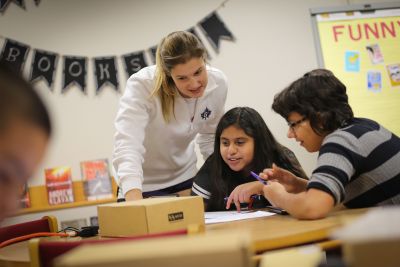GC students teach Goshen middle schoolers how to code with Google grant

Goshen Middle Schoolers are learning how to code with the help of Goshen College students and a grant from Google.
In April 2016, Goshen College’s Digital Eve group, led by Jeanette Shown, associate professor of computer science and information technology, and Meghan Gerke, a junior information technology major, received an $8,500 grant from Google’s IgniteCS program, an initiative that supports student groups committed to developing and delivering a computer science outreach program in their community.
Since October, student mentors from Goshen College have been facilitating a once-a-week coding club of about 30 students at Goshen Middle School (GMS), teaching computer science and programming “from hardware up to software,” Shown said.
A highlight of the club, according to Shown, is that nearly half of the middle school students participating in the program are girls.
“Middle school is the time when a lot of kids stop pursuing their interest in the scientific fields, especially girls,” Shown said. “We lose them in middle school, so we’re trying to recapture that interest.”
And it appears that they’re doing just that.
“I joined this club because I like working with technology, and I like learning how things work,” said sixth grader Nayely Arellano.
Sixth grader Grant Miller echoed that idea. “I like computers, and being able to learn to program is expanding my knowledge,” he said.
The students are learning to code using Raspberry Pi computers — single-board computers the size of a credit card — connected to 7-inch LCD touchscreens and wireless keyboards, all of which are paid for by the grant.
Students team up to solve problems and puzzles using code, play programming games, create mathematical artwork and build their coding skills.
“Teaching younger kids the fun portions of (coding) will get them more involved later on in life, so they’ll be more interested in the more complicated and difficult programming languages,” said Gerke. “Giving them an idea of what the opportunities are in the workforce now, so they can do web designing or programming, is super important.”
“I believe Indiana is very behind when it comes to teaching computer programming to its students,” Shown added. “In fact, we have a terrible brain-drain that doesn’t leave us much in Indiana to work with. One of our goals is to have more people who understand computers to do more computer programming and start companies. Our people are just as smart as anybody else’s.”
Colleges that apply for the IgniteCS grant are required to belong to a women in computer science group. GC has a chapter of Digital Eve, an organization based in Seattle that supports women in technology. “We also can have Digital Adams: men who support women in technology,” said Shown.
The grant is renewable, so if all goes well this year Shown plans to apply again next year. “I think it’s a great teaching experience for Goshen students,” she said.




